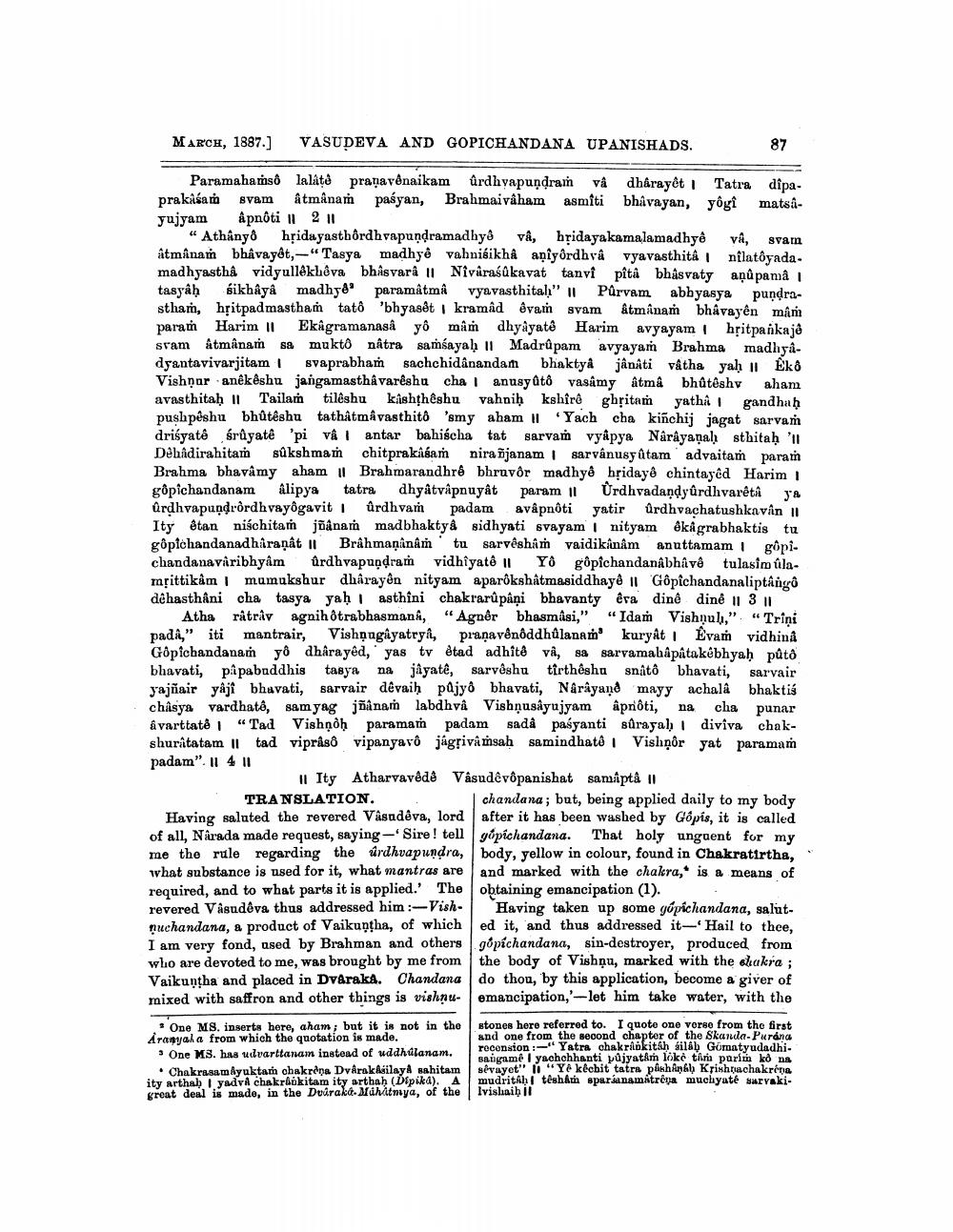________________
MARCH, 1887.] VASUDEVA AND GOPICHANDANA UPANISHADS.
87
Paramahamsô lalite pranavenaikam urdhyapundram và dh rayét I Tatra dipaprakasam svam âtmânam pasyan, Brahmaivâham asmiti bhavayan, yogi matsåyujyam âpnôti | 2 |
"Athânyo hridayasthôrdhvapundramadhy vâ, hridayakamalamadhyê vâ, svam âtmânam bhavayêt,-"Tasya madhye vahnisikha anîyôrdhva vyavasthita nilatôyadamadhyastha vidyullêkhêva bhâsvarâ II Nivaraśûkavat tanvî pîtâ bhasvaty anûpamâ | tasyah sikhaya madhya' paramâtma vyavasthital" Pûrvam abbyasya pundrastham, hṛitpadmastham tatô 'bhyasêt kramâd êvam svam âtminam bhâvayên mâm param Harim || Ek gramanash yô mầm dhyâyatê Harimavyayam I hitparkaje svam atmânam sa muktô nâtra samsayaḥ 11 Madrûpam avyayam Brahma madhyadyantavivarjitam svaprabham sachchidanandam bhaktyå jânâti vatha yah Ekô Vishnur anêkêshu jangamasthâvarêshu cha anusyûtô vasâmy âtmâ bhûtêshv aham avasthitaḥ Tailam tilêshu kishthêshu vahnih kshîrê ghritam yatha gandhaḥ pushpêshu bhûtêshu tathatmâvasthitô 'smy aham Yach cha kiñchij jagat sarvam driśyatê śrûyatê 'pi vâ antar bahiścha tat sarvam vyâpya Narayanal sthitaḥ 'Il Dêhâdirahitam sûkshmam chitprakasam niranjanam sarvânusy ûtam advaitam param Brahma bhavamy aham Brahmarandhrê bhruvôr madhyê hridayê chintayêd Harim I gopichandanam âlipya tatra dhyâtvâpnuyât param || Urdhvadandyûrdhvarêtâ ya ûrdhvapundrordhvayôgavit ûrdhvaṁ padam avâpnôti yatir ûrdhvachatushkavân || Ity êtan niśchitam jñânam madbhakty & sidhyati svayam nityam êkâgrabhaktis tu gopichandanadharanât | Brahmaṇânâm tu sarvêshâm vaidikânâm anuttamam gôpichandanavaribhyâm ûrdhvapuṇḍram vidhîyatê || Yo gopichandanâbhâvê tulasim ûlamṛittikâm mumukshur dhârayên nityam aparôkshâtmasiddhayê | Gopichandanaliptângô dêhasthâni cha tasya yah asthîni chakrarûpâni bhavanty êra dinê dinê 1 3 |||
Atha râtrâv agnih ôtrabhasmanâ, "Agnêr bhasmâsi," "Idam Vishnul," "Trini pada," iti mantrair, Vishṇngâyatryâ, pranavênôddhulanam kuryât Evam vidhina Gopichandanam yo dhârayêd, yas tv êtad adhîtê vâ, sa sarvamahâpâtakêbhyaḥ pûtô bhavati, papabuddhis tasya na jayatê, sarvêshu tîrthêshu snâtô bhavati, sarvair yajñair yaji bhavati, sarvair dêvaiḥ pûjyô bhavati, Narayanê mayy achalâ bhaktiś chasya vardhatê, samyag jñânam labdhva Vishnusâyujyam âpnôti, na cha punar avarttatė "Tad Vishnoh paramam padam sada pasyanti sûrayal diviva chakshurâtatam II tad viprâsô vipanyavô jagrivâmsaḥ samindhatê Vishnôr yat paramaṁ padam". 11 4 11
Ity Atharvavêdê Vâsudêvôpanishat samâptâ || TRANSLATION.
Having saluted the revered Vâsudêva, lord of all, Narada made request, saying-Sire! tell me the rule regarding the ardhvapundra, what substance is used for it, what mantras are required, and to what parts it is applied.' The revered Vasudeva thus addressed him :-Vishnuchandana, a product of Vaikuntha, of which I am very fond, used by Brahman and others who are devoted to me, was brought by me from Vaikuntha and placed in Dvaraka. Chandana mixed with saffron and other things is vishnu
One MS. inserts here, aham; but it is not in the Aranyak a from which the quotation is made.
One MS. has udvarttanam instead of uddhúlanam. Chakrasamayuktam chakrona Dvarakasilay sahitam ity arthab yadvi chakrüükitam ity arthah (Dipika). A great deal is made, in the Dvaraka. Mahatmya, of the
chandana; but, being applied daily to my body after it has been washed by Gôpis, it is called gopichandana. That holy unguent for my body, yellow in colour, found in Chakratirtha, and marked with the chakra, is a means of obtaining emancipation (1).
Having taken up some gopichandana, saluted it, and thus addressed it-Hail to thee, gopichandana, sin-destroyer, produced from the body of Vishnu, marked with the shukra ; do thou, by this application, become a giver of emancipation,'-let him take water, with the
stones here referred to. I quote one verse from the first and one from the second chapter of the Skanda-Purána recension:-"Yatra chakrinkitäh áilab Gömatyudadhisangamê yachchhanti pûjyatâm löke tam parim ko na sevayet" "Ye kêchit tatra pashanah Krishnachakrena mudritaḥ têshâm sparianamatrêņa muchyaté sarvakiIvishaib II




